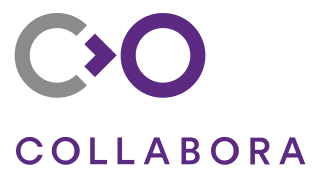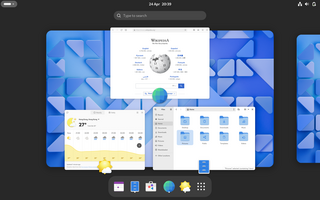
The GNU Compiler Collection (GCC) is an optimizing compiler produced by the GNU Project supporting various programming languages, hardware architectures and operating systems. The Free Software Foundation (FSF) distributes GCC as free software under the GNU General Public License. GCC is a key component of the GNU toolchain and the standard compiler for most projects related to GNU and the Linux kernel. With roughly 15 million lines of code in 2019, GCC is one of the biggest free programs in existence. It has played an important role in the growth of free software, as both a tool and an example.

OpenOffice.org (OOo), commonly known as OpenOffice, is a discontinued open-source office suite. Active successor projects include LibreOffice, Apache OpenOffice, Collabora Online and NeoOffice.

The GNU Project is a free software, mass collaboration project announced by Richard Stallman on September 27, 1983. Its goal is to give computer users freedom and control in their use of their computers and computing devices by collaboratively developing and publishing software that gives everyone the rights to freely run the software, copy and distribute it, study it, and modify it. GNU software grants these rights in its license.

Ututo is a Linux distribution consisting entirely of free software. The distribution is named for a variety of gecko found in northern Argentina.

Pitivi is a free and open-source non-linear video editor for Linux, developed by various contributors from free software community and the GNOME project, with support also available from Collabora. Pitivi is designed to be the default video editing software for the GNOME desktop environment. It is licensed under the terms of the GNU Lesser General Public License.

gNewSense was a Linux distribution, active from 2006 to 2016. It was based on Debian, and developed with sponsorship from the Free Software Foundation. Its goal was user-friendliness, but with all proprietary and non-free software removed. The Free Software Foundation considered gNewSense to be composed entirely of free software.
Spreadsheet is a class of application software design to analyze tabular data called "worksheets". A collection of worksheets is called a "workbook". Online spreadsheets do not depend on a particular operating system but require a standards-compliant web browser instead. One of the incentives for the creation of online spreadsheets was offering worksheet sharing and public sharing or workbooks as part of their features which enables collaboration between multiple users. Some on-line spreadsheets provide remote data update, allowing data values to be extracted from other users' spreadsheets even though they may be inactive at the time.
GNU variants are operating systems based upon the GNU operating system. According to the GNU project and others, these also include most operating systems using the Linux kernel and a few others using BSD-based kernels.

In the 1950s and 1960s, computer operating software and compilers were delivered as a part of hardware purchases without separate fees. At the time, source code, the human-readable form of software, was generally distributed with the software providing the ability to fix bugs or add new functions. Universities were early adopters of computing technology. Many of the modifications developed by universities were openly shared, in keeping with the academic principles of sharing knowledge, and organizations sprung up to facilitate sharing. As large-scale operating systems matured, fewer organizations allowed modifications to the operating software, and eventually such operating systems were closed to modification. However, utilities and other added-function applications are still shared and new organizations have been formed to promote the sharing of software.

Orca is a free and open-source, flexible, extensible screen reader from the GNOME project for individuals who are blind or visually impaired. Using various combinations of speech synthesis and braille, Orca helps provide access to applications and toolkits that support AT-SPI.

Collabora is a global private company headquartered in Cambridge, United Kingdom, with offices in Cambridge and Montreal. It provides open-source consultancy, training and products to companies.

Go-oo is a discontinued free office suite which started as a set of patches for OpenOffice.org, then later became an independent fork of OpenOffice.org with a number of enhancements, sponsored by Novell.
The Free Software Foundation (FSF) is a 501(c)(3) non-profit organization founded by Richard Stallman on October 4, 1985, to support the free software movement, with the organization's preference for software being distributed under copyleft terms, such as with its own GNU General Public License. The FSF was incorporated in Boston, Massachusetts, US, where it is also based.

GNOME, originally an acronym for GNU Network Object Model Environment, is a free and open-source desktop environment for Linux and other Unix-like operating systems.

LibreOffice is a free and open-source office productivity software suite, a project of The Document Foundation (TDF). It was forked in 2010 from OpenOffice.org, an open-sourced version of the earlier StarOffice. The LibreOffice suite consists of programs for word processing, creating and editing of spreadsheets, slideshows, diagrams and drawings, working with databases, and composing mathematical formulae. It is available in 115 languages. TDF does not provide support for LibreOffice, but enterprise-focused editions are available from companies in the ecosystem.

LibreOffice Calc is the spreadsheet component of the LibreOffice software package.

Collabora Online is an open source online office suite built on LibreOffice Technology, enabling Web based collaborative real-time editing of word processing documents, spreadsheets, presentations, and vector graphics. Optional apps are available for desktops, laptops, tablets, smartphones and Chromebooks.













